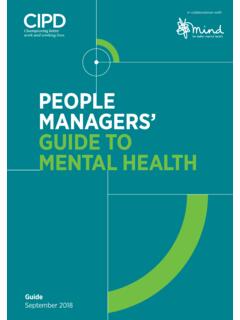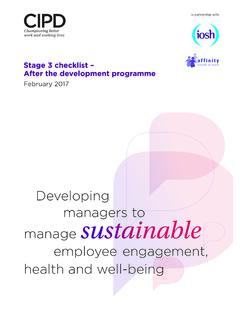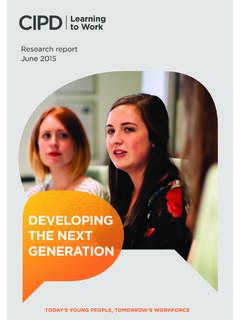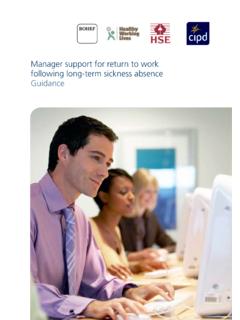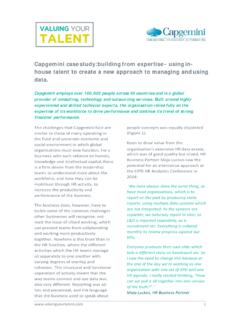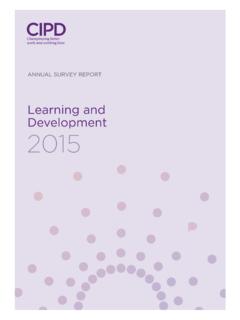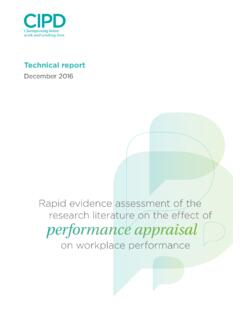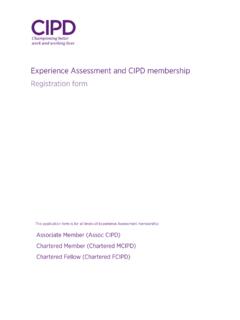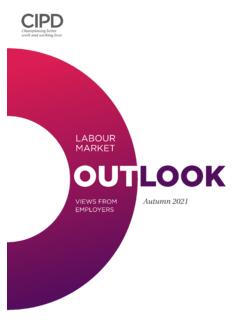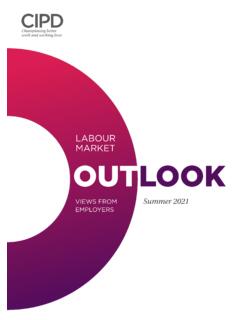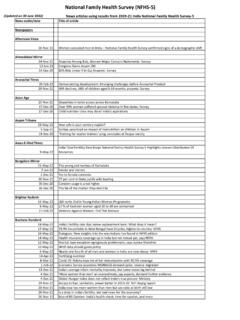Transcription of Resourcing and talent planning survey 2021
1 NeReport September 2021 Resourcing AND talent planning survey 2021in partnership withThe CIPD is the professional body for HR and people development. The registered charity champions better work and working lives and has been setting the benchmark for excellence in people and organisation development for more than 100 years. It has more than 160,000 members across the world, provides thought leadership through independent research on the world of work, and offers professional training and accreditation for those working in HR and learning and CIPD s Resourcing and talent planning survey , in partnership with Omni RMS, examines Resourcing and talent planning practices and the key challenges organisations are facing.
2 It provides people professionals and their organisations with benchmarking data on important areas such as recruitment costs, workforce planning and retention. This survey was conducted online in May 2021 by YouGov. In total, 1,018 UK-based HR/people professionals responded to the survey . 11 Resourcing and talent planning survey 2021 ReportResourcing and talent planning survey 2021 AcknowledgementsThe CIPD and Omni are incredibly grateful to the organisations and individuals who gave their time and expertise to provide feedback to help inform this report.
3 These include: Rachel Bennett, Director of People Services, Longhurst Group Annette Canning, Strategic Lead People Partnering, EnableNY, North Yorkshire Police Matt Eyre, Candidate Marketing Manager, The Co-op Danny Matthews, Apprenticeship & Community Resourcing Lead, The Co-op Manjuri Sinha, Global Head of talent Acquisition, OLX Group Sarah Thorne, COO, The Return Hub Kerry West, talent and Development Manager, EnableNY, North Yorkshire PoliceThanks also to Annette Hogarth, research consultant, for analysing the findings and writing the informationWhen citing this report, please use the following citation:CIPD.
4 (2021) Resourcing and talent planning survey 2021. London: Chartered Institute of Personnel and CIPD foreword 2 Omni foreword 3 Summary of key findings 5 Resourcing and talent practices in the current climate 10 Recruiting: the numbers 14 Attraction strategies 18 Selection processes 25 Recruitment difficulties 30 talent management and retention 32 Workforce planning 34 Background to the survey 372 Resourcing and talent planning survey 20211 CIPD forewordThe CIPD s Resourcing and talent planning survey , in partnership with Omni, is now in its twenty-second year.
5 It is a valued survey with a sample this year of over 1,000 UK-based HR professionals. This year s survey went live in May 2021 as the UK was starting to emerge from its third COVID-19 lockdown and just over four months after the brexit transition period ended. It explores the impact of COVID-19 and leaving the EU on Resourcing activities as well as ongoing trends in Resourcing practices and challenges. A number of key themes emerged this year. Navigating the challenges of the pandemicThe pandemic has had a widespread impact on organisations and the workforce.
6 Two-fifths have had furloughed workers, just over a fifth of organisations have made redundancies, and many more have reduced working hours, put recruitment activity on hold and/or decreased recruitment in response. Recruitment difficulties have also been exacerbated by the pandemic. More than a quarter report logistical challenges in facilitating socially distanced recruitment processes, while almost a third faced challenges onboarding new hires. Yet competition for talent the impact of the pandemic and growth in unemployment, almost half of employers believe that competition for well-qualified talent has increased over the past year, and a similar number of employers who attempted to recruit had difficulties attracting suitable candidates.
7 A quarter of organisations also report it is more difficult to recruit employees as a consequence of leaving the EU. The labour market has changed dramatically in recent months, and we are now seeing a growing crisis in hiring, with very significant skills and talent gaps across many roles. Attracting returners, focusing on flexible working and work life balanceSome of the strategies organisations are adopting to attract new employees include appealing to experienced workers through career-returner programmes and mid-career-change programmes, which have both increased compared with last year.
8 We are also seeing a growing focus on flexible working and work life balance, with a high proportion of organisations advertising at least some vacancies as open to flexible working and over half offering greater work flexibility and improved work life balance to address both recruitment and retention over from last year, it continues to be the case that organisations could be more proactive in their efforts to attract and recruit diverse candidates, especially at board many organisations taking an ad hoc approach to recruitmentMore than two-fifths of organisations say they take an ad hoc approach to recruitment and less than half have a workforce planning strategy based on a robust understanding of current and future workforce needs.
9 Most organisations are also not taking a robust approach to collecting data to inform Resourcing decisions. Just over a third collect data to identify skills gaps within their organisation and less than a third to identify future skill a more strategic, joined-up approach to recruitment and talent management activities will help organisations to get to grips with their existing talent profile and CIPD foreword33 Resourcing and talent planning survey 2021 Omni forewordtheir current and future requirements. Collecting and evaluating data, and strengthening approaches based on the insights gained, are essential for supporting the effectiveness and efficiency of Resourcing strategies.
10 More focus needed on talent management and retentionFinally, organisations focus on talent management has fallen during the pandemic and fewer organisations undertook specific initiatives to improve employee retention in the last 12 months compared with previous years. Even in organisations that reported talent was increasingly difficult to retain, only two-fifths had undertaken retention initiatives. As the economy improves and recruitment and talent management budgets also fare better, it will be important for organisations to place greater focus on these key areas to help support their post-pandemic recovery.
